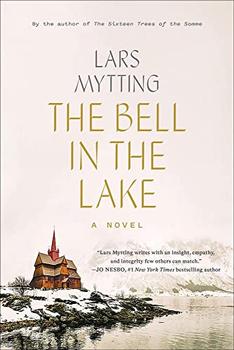Summary | Excerpt | Reading Guide | Discuss | Reviews | Beyond the Book | Readalikes | Genres & Themes | Author Bio

Sister Bells Trilogy #1
by Lars Mytting
The family entered and saw that Gunhild was close to death. She seemed not to notice them, for she lay with her face turned to her sister and said:
"Ye shall shuttle wide, and I shall shuttle close, and when the weave be woven we two shall return."
She took Halfrid's hands and folded them in her own, made herself comfortable, and thus they lay with their hands clasped, as though in two-voiced prayer.
Later, the family disagreed over what Gunhild had meant, since the local dialect made for ambiguity. "Shuttle" might refer to their weaving but also to their moving fast. When the weave was donated to the church, the pastor wrote Gunhild's last words on the back of the wooden mount, but the complexity of the original was all but ironed out: "Ye shall go a long way, and I a short way, and when the weave is done we shall return."
The girls were buried under the church floor, and in thanks for their dying together Eirik Hekne had two church bells cast. They were named the Sister Bells, and they rang with a unique richness and depth of tone. Their sound carried from the stave church across the valley and to the mountains, where it echoed against the rocks. When there was black ice on Lake Losnes, below the church, the bells could be heard in the three neighbouring villages as a distant harmony over their own bells, and in the summer, when the wind was right, some folk even claimed they could hear them all the way up in the seters.
The first bell-ringer went deaf after three services. A wooden platform was erected at the bottom of the tower for the next to stand on, who stuffed his ears with beeswax and wound a leather strap round his head and ears.
The Sister Bells had neither a sad nor fearful ring. At the core of each chime was a vibrancy, a promise of a better spring, a resonance coloured by beautiful, sustained vibrations. Their sound penetrated deeply, creating mirages in the mind and touching the most hardened of men. With a skilful bell-ringer the Sister Bells could turn doubters into churchgoers, and the explanation for their powerful tone was that they were malmfulle – that silver had been added to the bronze when the church bells were cast. The more silver, the more beautiful and resonant the chime.
The skilfully crafted moulds and bronze had already cost Eirik Hekne a fortune, far more than his twin daughters had ever earned with their weaves. In the madness of his grief he went to the melting pot and threw in all his silver cutlery, then shoved his big working hands deep into his pockets and threw two fistfuls of silver dalers into the boiling alloy, coins that stayed on the surface surprisingly long, before they melted and the bubbles rose.
The first time the Sister Bells were said to warn of danger was during a big flood in the valley. That year, the mountain snowmelt came suddenly and violently, heads throbbed beneath the black Pentecostal sky, and on the night that the river found a new path the villagers were woken by the church bells ringing. The rain set in, and the inhabitants of two farms only just managed to escape before their houses were swept away by the flood. Massive log buildings were flung over, their timbers strewn like twigs along a watery gash in the landscape. And out on the lake, white bundles were seen to float, low and heavy in the water – sheep. Only later, when the villagers stood in the pouring rain trying to account for everyone, did they find that all the members of the bell-ringer's family were present, and that he had not been in the church. And when the priest went down to check he found that the church door was, and had been, firmly locked.
Eirik Hekne had been dead for many a year. There is nothing to indicate that he ever regretted melting his silver, but so much had gone into the Sister Bells that the farm teetered several times on the brink of a forced sale. Were it possible to divide Hekne into two farms, it would have been done, but the land was too steep and narrow. In the next few years, the bailiff took Lower Glupen, two crofts and the largest seter, and later generations paid for Eirik's excesses. They managed to keep the rest of the farm in the family, heirs begat heirs, and they all had an opinion about their forefather. Few felt that silver was better spent on church bells than on fields and barns, yet they took it as a reminder that hardship was easier to bear than sorrow. Every Sunday soothing chimes floated up to the farmstead from the bells that Eirik had once called the Daughter Bells, a custom and right that had died with him.
Excerpt from the new book The Bell in the Lake by Lars Mytting published by The Overlook Press © 2020
Your guide toexceptional books
BookBrowse seeks out and recommends the best in contemporary fiction and nonfiction—books that not only engage and entertain but also deepen our understanding of ourselves and the world around us.